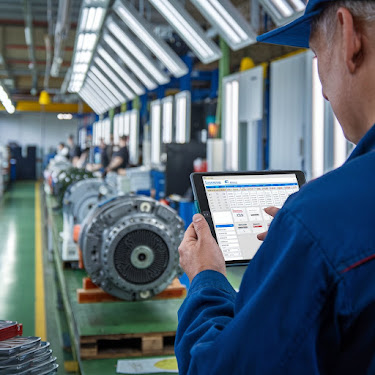How Manufacturing ERP Software Drives Success by Using Lean & Six Sigma Strategy?
In the rapidly changing landscape of manufacturing, success hinges not just on producing goods but on doing so efficiently, sustainably, and with a focus on continuous improvement. In this digital era, the convergence of Manufacturing ERP software and Lean Strategy in manufacturing has become a game-changer, revolutionizing how businesses operate and thrive. Let's delve into how this powerful combination drives success for manufacturers.
Understanding the Essentials: Manufacturing ERP and Lean Strategy
Manufacturing ERP software serves as the center of operations, integrating various processes like inventory management, production planning, procurement, and customer relationship management. It provides real-time insights, streamlines workflows, and enhances collaboration across departments, leading to improved decision-making and operational efficiency.
On the other hand, Lean Management in Manufacturing, derived from Lean principles pioneered by Toyota, emphasizes eliminating waste, optimizing processes, and fostering a culture of continuous improvement. It focuses on maximizing customer value while minimizing resources, time, and effort expended, resulting in enhanced productivity and profitability.
When
these two strategies combine, manufacturers can achieve operational
excellence by identifying and eliminating non-value-added
activities, optimizing workflows, and ultimately delivering high-quality
products to customers with maximum efficiency and minimum cost.
Integrating Manufacturing ERP Software with Lean Principles
Lean
manufacturing principles combined with manufacturing ERP software improve
operations and propel performance.
(1)
Efficient Resource Utilization:
Manufacturing
ERP software, when aligned with Lean manufacturing principles, enables
manufacturers to optimize resource utilization by identifying and eliminating
waste. This includes reducing excess inventory, optimizing production
schedules, and minimizing downtime in order to save money and better allocate
resources.
(2)
Streamlined Workflows:
Integration
of lean management in manufacturing into ERP systems facilitates streamlined
workflows by standardizing processes, eliminating bottlenecks, and reducing
cycle times. This ensures smoother operations, faster response to
customer demands, and enhanced agility in adapting to market fluctuations.
(3)
Customer-Centric Approach:
Lean
principles emphasize understanding and fulfilling customer needs efficiently.
By integrating Lean thought into ERP systems, manufacturers can
enhance customer satisfaction through shorter lead times, improved product
quality, and personalized services, fostering long-term customer loyalty and
retention.
(4)
Cultural Transformation:
Implementing
a Lean manufacturing strategy through ERP software goes beyond processes; it
fosters a cultural shift toward continuous improvement, collaboration, and
employee empowerment. This results in a motivated workforce, increased innovation, and
a shared commitment to achieving organizational goals.
(5)
Inventory Management:
One of
Lean's key objectives is minimizing inventory waste while ensuring product
availability. ERP software with robust inventory management modules enables
just-in-time inventory practices, optimized stocking levels, and accurate
demand forecasting. This synergy between Lean and ERP reduces inventory holding
costs and enhances responsiveness to market fluctuations.
(6)
Data-Driven Decision Making:
Manufacturing ERP Software empowers businesses with
real-time data insights, dashboards, and analytics. When
combined with Lean metrics such as lead time reduction, cycle time
improvement, and defect reduction, it enables data-driven decision-making for
continuous process optimization and performance enhancement.
Key Benefits of Lean-based ERP for Manufacturers
1. Enhanced Efficiency: By eliminating waste and optimizing workflows, Lean-based ERP software boosts operational efficiency, reduces costs, and accelerates time-to-market for products.
2. Improved Quality: Better process controls, real-time monitoring, and data-driven insights lead to higher product quality, lower defect rates, and enhanced customer satisfaction.
3. Agile Responsiveness: Manufacturers can respond quickly to changes in the market, requests from customers, and interruptions in the supply chain by combining lean concepts with ERP agility.
4. Sustainable Growth: The synergistic impact of Lean-based ERP fosters a culture of continuous improvement, innovation, and sustainable growth for manufacturers.
Overcoming Challenges and Driving Continuous Improvement
To drive continuous improvement, manufacturers can:
- Conduct regular Lean assessments and audits to identify areas for optimization.
- Provide ongoing training and development programs to empower employees with Lean skills and ERP Consulting.
- Foster a culture of innovation, collaboration, and knowledge sharing to sustain Lean-driven ERP initiatives.
Conclusion
In
conclusion, manufacturing ERP software, when combined with lean management in manufacturing is pivotal in driving success
for manufacturers in today's dynamic business environment. By harnessing
the power of data, efficiency, and continuous improvement, businesses can
achieve operational excellence, enhance customer value, and stay ahead of
the competition. Embracing this integrated approach is not just
a strategic choice but a transformative journey toward future-ready
manufacturing excellence.
Solutions to Popular Queries
(1) What are the benefits of using ERP software for inventory management in lean manufacturing?
Answer: The
benefits of using ERP software for inventory management in Lean Manufacturing include optimized
inventory levels, reduced transportation expenses, and automated replenishment
processes, leading to efficient resource utilization and cost savings.
(2) Can ERP software help in reducing waste and improving efficiency?
Answer: Absolutely. ERP software aligns with lean principles by identifying and eliminating waste, optimizing resource utilization, and supporting continuous improvement for efficiency and operational excellence. To learn more about ERP let's Schedule a FREE Demo.




Comments
Post a Comment